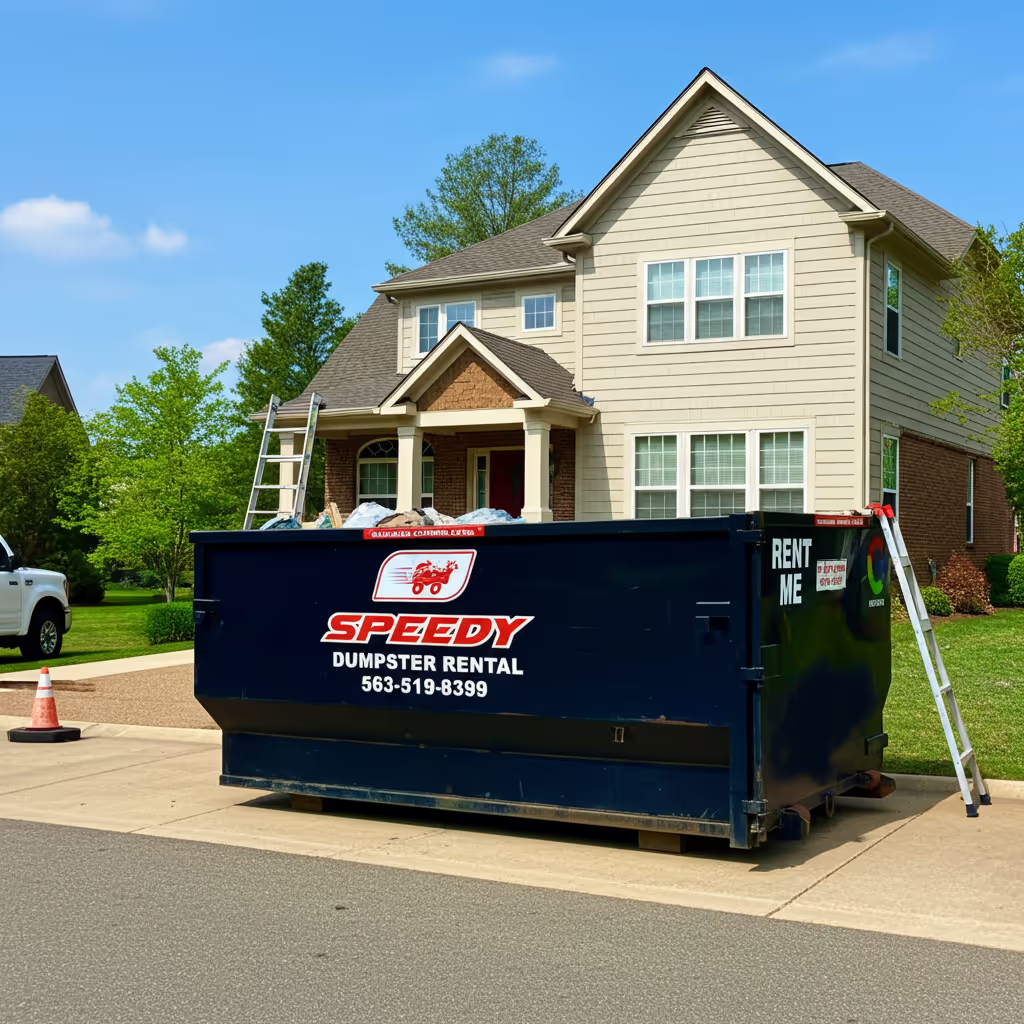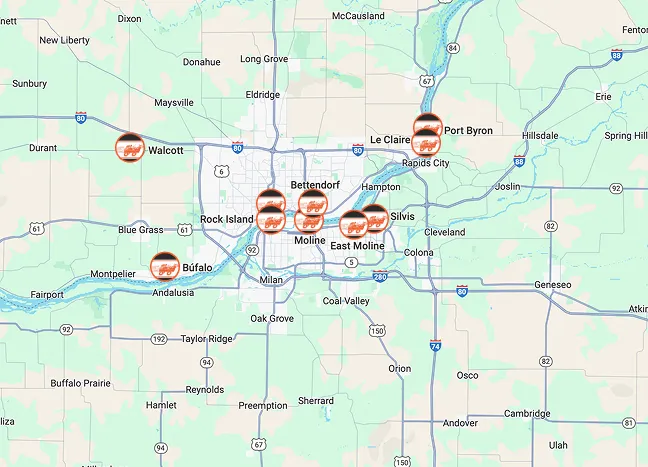OFFICE HOURS
Monday - Sunday: 7:00 AM - 7:30 PM

Dumpster Rentals
Choose from a wide range of dumpsters for residential, commercial, and construction projects. Speedy Dumpster Rental LLC delivers dependable service, affordable pricing, and flexible rental options.
Dumpster Rentals
Renting the right dumpster removes a major headache from renovation, construction, or cleanout projects. Whether you are tackling a kitchen remodel, landscaping debris, or a full-home cleanout, understanding roll-off sizes, weight limits, rental periods, permitted materials, and delivery logistics helps you complete the job on time and on budget.
Which dumpster size fits your project
Choosing the correct roll-off dumpster size prevents overages and unnecessary rentals. Common sizes and typical uses:
- 10-yard — Small cleanouts, single-room remodels, small shed demolition.
- 15-yard — Garage cleanouts, minor renovations, medium landscape projects.
- 20-yard — Kitchen or bathroom remodels, larger cleanouts.
- 30-yard — Whole-house renovations, larger roof tear-offs, multi-room demo.
- 40-yard — Major construction sites, commercial projects, large roof or siding jobs.
Tip: Visualize how much waste stacks in cubic yards (a pickup truck bed is roughly 1–2 cubic yards). Renting one size larger is often safer than risking overfill.
Weight limits and disposal rules
Roll-off dumpsters have weight limits that depend on the size and local disposal facility rules. Typical industry ranges are:
- Light loads (wood, household trash, cardboard): lower cost per ton, lighter overall weight.
- Heavy loads (concrete, dirt, brick, tile): consume more of the dumpster’s weight allowance quickly and may require a heavy-haul container or multiple loads.
Weight-related charges usually appear as a separate line item. Expect additional fees if your load exceeds the stated limit.
Rental periods and pricing structure
Rental terms are flexible but commonly structured like this:
- Standard rental window — Often a fixed period (for example, several days to a week). Extensions are available if you need more time.
- Pricing components:
- Base rental fee (covers drop-off, pick-up, and a set number of days)
- Tonnage/disposal fee (based on actual weight)
- Additional day charges for extended rentals
- Overage fees for prohibited items or excess volume/weight
- Permit or placement fees when applicable
Pricing varies by region and disposal costs. Reviewing the pricing components before booking prevents surprises.
Permits and placement
A permit is usually required when a dumpster will sit on public property (street, sidewalk, alley). Permit rules differ by municipality but commonly require:
- Application that specifies size and placement dates
- Coordination with local parking and traffic regulations
- Payment of municipal permit fees in some areas
If you plan to place a dumpster on a driveway or private property, permits are typically not needed. However, confirm local rules if your project borders a public right of way.
Delivery, pickup, and site preparation
Efficient delivery and pickup reduce project delays. Prepare the site and know the logistics:
- Ensure at least one travel lane clear for the roll-off truck; trucks need straight access and turning space.
- Clear overhead obstructions (power lines, tree branches) along the drop-off path.
- Protect paved surfaces with wood boards or mats if the dumpster will sit on delicate surfaces to prevent gouging.
- Indicate preferred placement and possible alternate spots to the delivery team.
- Keep the dumpster accessible for pickup on scheduled removal days.
Drivers will set the dumpster down using the roll-off frame and will not usually move it once placed without additional requests.
Permitted and prohibited materials
Most rentals accept common construction and household debris, but hazardous materials and certain items are always prohibited. Typical lists:
Permitted
- Household trash and debris
- Wood, lumber, siding and roofing materials (non-hazardous)
- Drywall, tile, carpeting
- Furniture and non-electronic appliances (check local recycling rules)
Prohibited
- Hazardous waste (asbestos, treated wood, chemical containers)
- Oil, gasoline, and motor fluids
- Paints and solvents unless fully dried and permitted locally
- Batteries, electronics (TVs, computers) — may require special recycling
- Medical waste and sharps
If you have mixed loads or suspect materials might be restricted, disclose them before booking to avoid refusal or contamination fees.
Booking process and payment/cancellation policies
A smooth booking experience typically follows these steps:
- Choose the right dumpster size based on project scope and debris type.
- Select rental dates and note any permit needs.
- Confirm weight allowance, placement instructions, and restricted materials.
- Provide payment information — common options include credit/debit card or invoice.
- Schedule delivery and confirm pickup window.
Payment and cancellation norms:
- Rentals often require payment or a deposit at booking and final invoicing after pickup (for weight-based fees).
- Cancellation windows vary; a standard window is 48–72 hours to avoid short-notice fees.
- Last-minute schedule changes may incur rescheduling or extra charge.
Benefits of timely, proper dumpster use
Using a dumpster rental correctly saves time, reduces safety hazards, and helps stay compliant with disposal regulations. Proper separation of recyclables and hazardous materials reduces landfill costs and maximizes recycling. For construction and renovation projects, an on-site dumpster keeps the work area productive and lowers labor costs associated with hauling debris.
Maintenance and load best practices
- Load evenly and avoid high, unbalanced piles that can lead to overhanging materials or unsafe transport.
- Break down large items to maximize space.
- Stack flat items like drywall and plywood to reduce voids.
- Keep prohibited items separate and plan for special disposal or recycling options.
Frequently asked questions
Q: How long can I keep the dumpster?
A: Standard rentals cover a fixed period (often several days to a week). Extensions are available for additional fees when you need more time.
Q: What if my project produces heavy debris like concrete or dirt?
A: Inform the rental company before booking. Heavy materials consume the tonnage allowance quickly and may require a different dumpster or separate disposal arrangements.
Q: Do I need a permit for curbside placement?
A: If the dumpster will sit on public property such as the street or sidewalk, most municipalities require a permit. Private property placement usually does not.
Q: What happens if prohibited items are found in the dumpster?
A: Prohibited items can result in refusal for disposal, contamination fees, or the requirement to separate and remove the items at additional cost.
Q: How do weight fees work?
A: The hauler measures the loaded dumpster weight (gross minus tare) and applies a per-ton disposal charge if your load exceeds the included allowance.
Choosing the right dumpster rental means matching size, weight capacity, and rental terms to your project needs while following local rules for permits and disposal. Proper preparation and understanding common restrictions keep projects on schedule and avoid unexpected fees.

SERVICE AREAS
We proudly provide dumpster rental services to Davenport, IA and the surrounding communities.

